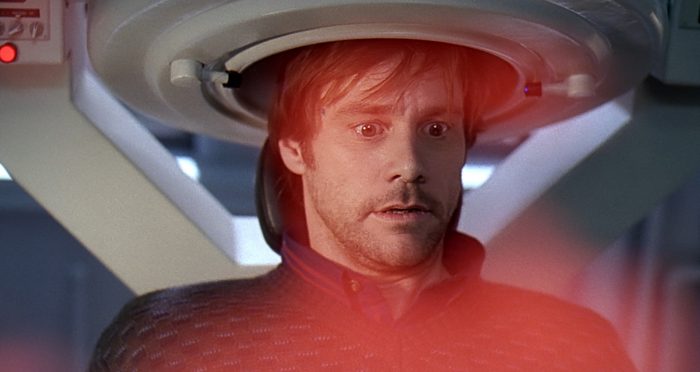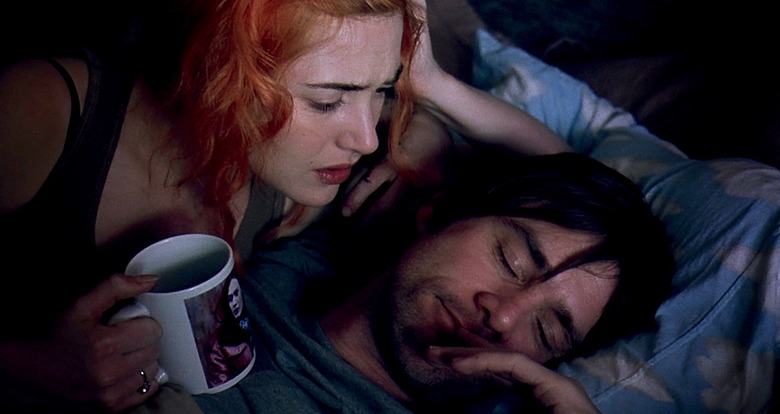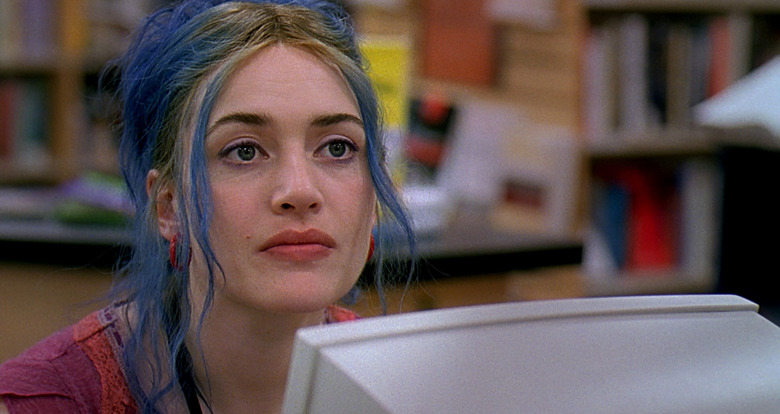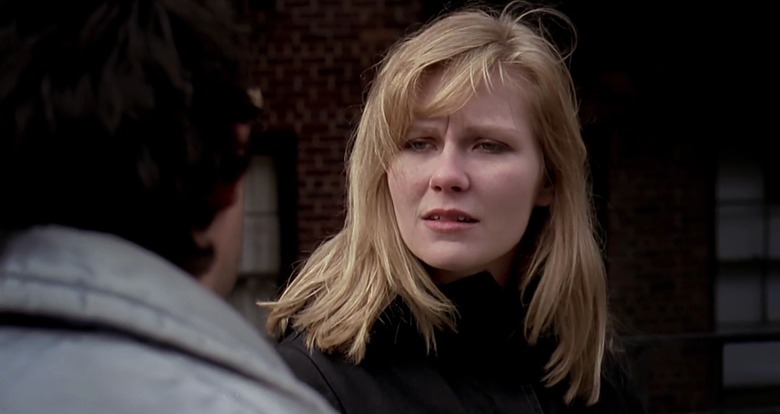'Eternal Sunshine Of The Spotless Mind' At 15: Don't Let Your Memory Of This Movie Get Deleted
"Random thoughts for Valentine's Day 2004. Today is a holiday invented by greeting card companies to make people feel like crap."
Those are the first spoken lines in Eternal Sunshine of the Spotless Mind. Jim Carrey's voice is laced with melancholy and wry humor as he lets us in on the internal monologue of his character, Joel Barish. It's a far cry from the sassy voice that launched him to movie stardom ten years earlier in Ace Ventura: Pet Detective. Yet there's a whole contingent of moviegoers who, prior to this film and a couple of comparable screen gems in the early 2000s, might have felt it was an awkward question if you asked them, "What's your favorite romantic comedy?"
Joel's voice speaks for those people. Like Punch-Drunk Love in 2002 (also soundtracked by Jon Brion) and Lost in Translation in 2003, Eternal Sunshine of the Spotless Mind is a movie that wrangled career-best work out of a comedic actor, simply by injecting pathos into him via a strong script with an auteurist director behind the camera. Instead of a straight-up comedy, we see Carrey dialing down his usual antics and appearing in a romantic dramedy, one that in this case happens to be blended with quirky sci-fi, too.
It helps that he's surrounded by a stellar supporting cast. Joel may be the protagonist, but the two most interesting characters in Eternal Sunshine of the Spotless Mind are actually women. The movie uses the deletion of memories as a plot device, and viewers who fell in love with it in the theater back in March 2004 now have a decade and half of other life experiences vying for recollection space in their heads. As it celebrates its 15th anniversary this week, let's reclaim the memory (with spoilers) of one of the quintessential films of the 2000s.

Eternal Sunshine of the Spotless Mind hit theaters the same day as Zack Snyder's Dawn of the Dead back in 2004. Like Snyder, director Michel Gondry had a background in music videos. Among many other credits to his name is the innovative Lego-animation video for The White Stripes' breakthrough hit, "Fell in Love with a Girl." In a 2002 video for a song from the same album, "Dead Leaves and the Dirty Ground," the director also depicted a man walking through his own memories, as singer Jack White saw visions of his past life projected onto the walls of a dilapidated house.
In Eternal Sunshine of the Spotless Mind, Gondry employs numerous practical effects to build a convincing landscape of the mind. Whether it be a forced-perspective kitchen where Joel inhabits the body of a baby-sized version of himself, or a spotlight that illuminates him as he seeks to escape the dark void of vanishing memories, the mental topography here is appropriately surreal. Joel wants to forget his ex-girlfriend, Clementine, because she's already had him wiped from her brain, courtesy of a firm named Lacuna, Inc., which specializes in the dubious service of memory erasure.
Eternal Sunshine of the Spotless Mind was the culmination of a five-year screenwriting hot streak for Charlie Kaufman, who would cross over into directing with his next project, Synecdoche, New York. Kaufman's scripts for Being John Malkovich (1999) and Adaptation (2002) had both received Oscar nominations; his whip-smart script for Eternal Sunshine of the Spotless Mind is the one that would finally win him the award.
Rewatching Eternal Sunshine of the Spotless Mind in 2019, I was struck by the similarities between it and another Carrey film, The Truman Show, which I revisited for /Film last year. Here again, there are larger unseen forces working against Carrey's character. While he's unconscious — reliving his memories at the same time Lacuna technicians are deleting them — Joel can overhear voices from the outside world. He looks up to the sky at the voices, just like Truman does. At one point, we even see his contented, sleeping face lying on a pillow in an image that recalls the poster for The Truman Show.
This time, however, a woman's head comes sliding into the frame with him.
Manic Pixie Dream Destroyers
As Clementine, Kate Winslet is a force of nature. Eternal Sunshine of the Spotless Mind emancipated Winslet from the period costumes that marked much of her early career. With her outgoing, mercurial nature and her dyed hair (the first of several colors we see is "Blue Ruin," she informs), there's an irrepressible quality to Clementine that feels like a credible reciprocal to the subdued, hipsterish quality of Joel—he of the five o'clock shadow and collared shirt and sweater combo. You really believe that Joel and Clementine are two people who might meet (or reunite with no memory of each other) on the train in New York.
With so much of the Clementine we see existing in Joel's consciousness and coming to his aid in his escapade there, the character does skate the edge of what film critic Nathan Rubin famously called the "Manic Pixie Dream Girl." As Alison Herman noted for Flavorwire on the film's 10th anniversary, however, Eternal Sunshine of the Spotless Mind is a movie that destroyed that stereotype before it even existed.
She's not a dead girlfriend like in other movies, but yes, there is the obligatory flashback of Clementine under the bedcovers with light filtering through them. Yet scenes like this are offset by other moments outside Joel's mind where we can perceive that Clementine does have an inner life of her own.
When a creepazoid Lacuna technician, played to perfection by Elijah Wood, inveigles his way into a relationship with her using knowledge stolen from Joel's memories, she can sense that something is wrong. We see that she has all this bottled-up emotion that exists apart from Joel, and it makes her feel like more of a real autonomous being. If anything, her character seems like a knowing rebellion against the idea of a stock female character who lives solely to assist the male hero in his quest for self-discovery. This is evident in the line:
"Too many guys think I'm a concept, or I complete them, or I'm gonna make them alive. But I'm just a fucked-up girl who's looking for my own peace of mind. Don't assign me yours."
Winslet is an eight-time Academy Award nominee, but this might actually be her best performance. The other MVP of Eternal Sunshine of the Spotless Mind is Kirsten Dunst. Ironically, it was Dunst's character in the 2005 Cameron Crowe film Elizabethtown that led to the coinage of that term, Manic Pixie Dream Girl.
In Eternal Sunshine of the Spotless Mind, Dunst plays Mary, a receptionist for Lacuna, Inc. Unbeknownst to Mary, she's had her own memories of an affair with her older boss, Dr. Mierzwiak (Tom Wilkinson), erased. Yet she continues to work right alongside him, all the while harboring an unexplainable fixation on him ... even as she and another Lacuna staffer, Stan (Mark Ruffalo) bounce around in their underwear, waxing philosophical about The Clash and passing lit doobies back and forth.
Early on in the film, Dr. Mierzwiak downplays the dangers of the memory erasure procedure with a line of crackerjack dialogue:
"Technically speaking, the procedure itself is brain damage, but it's on par with a night of heavy drinking."
Mary has essentially blacked out her whole affair with him. She doesn't realize what she did, or what he did to her, and she doesn't understand it when she feels compelled to throw herself at him again. Unfortunately, Dr. Mierzwiak's wife shows up outside the window right as Mary leans and impulsively kisses him.
At that point, the lie of the spotless mind becomes untenable. When the truth of her situation finally comes out — "We have a history," Dr. Mierzwiak admits to her — it lands hard, giving Mary one of the most poignant arcs in the film.
Blessed Are the Forgetful
Memory erasure isn't just a fantasy plot contrivance. It's a real field of research and experimentation. The movie doesn't delve much into the neuroscience behind it. ("It's a place that does a thing!" says David Cross's character of Lacuna). Yet in its own way, Eternal Sunshine of the Spotless Mind is as much science fiction as films like Total Recall and Men in Black, both of which also feature memory erasure.
It's the film's nonlinear narrative, however, that has seen other recent tentpoles like Captain Marvel drawing comparisons to it. As faces blur out of existence in Joel's precarious mind landscape, the old reliable race-against-time plot mechanism raises the stakes. We know these two people, Joel and Clementine, are in danger of losing each other forever simply because they will have no memory of each other once the erasure process is complete.
Eternal Sunshine of the Spotless Mind leaves its characters in a place where they face an uncertain future at the end. Mary has quit her job at Lacuna, cleaning out her desk and loading up her car with boxes—some of which contain the liberated tapes and files of patients. Stan walks her out to the car and tells her he really likes her. He seems like such a nice guy; in another movie, maybe they'd end up together before the credits roll, giving us a happy ending whereby the trauma of Mary's recovered knowledge and heartbreak is instantly healed.
As it is, she's got bigger fish to fry. She mails Clementine and Joel their tapes and the two of them realize that the person they thought was an exciting new romantic prospect is actually someone with whom they already had an imperfect, at times difficult relationship history.
It's not only big problems but also little annoying things that previously drove a wedge between them. Clementine's funny tendency to pronounce the word "library," like, "lie-berry," embarrasses Joel. Hearing him complain about her on tape in one of his Lacuna sessions, she walks out on him, but he chases her down in the hallway of his apartment building.
"I can't see anything that I don't like about you right now," he says.
"But you will," Clementine retorts. "You will. You know, you will think of things, and I'll get bored with you and feel trapped because that's what happens with me."
Hearing this, Joel shrugs and says, "Okay."
Realizing he accepts it, Clementine accepts it, too.
"Okay? Okay!"
The last image we see, before the film fades to white, is them running down the beach. Joel playfully scoops up sand onto Clementine, then the image hiccups and rewinds itself so that we see the same thing happen two more times. It's a subtle way of leaving the viewer thinking about how people repeat themselves in their lives.
Thematically, this loops us back to a Nietzschean quote that Mary shared earlier in the film. "Blessed are the forgetful, for they get the better even of their blunders." In the same scene, she had also shared the quote that gives the movie its title:
"How happy is the blameless vestal's lot! / The world forgetting, by the world forgot / Eternal sunshine of the spotless mind! / Each pray'r accepted, and each wish resign'd."
This comes from a long poem called "Eloisa to Abelard" by Alexander Pope. The titular Eloisa, or Héloïse, was a French woman who fell in love with her teacher and married him, only to have him send her away to a convent to preserve his reputation. Living the life of a cloistered nun, she forgets the world and the world forgets her, but she also finds peace in not dwelling on the past.
A Realistic Love Story, Flaws Included
This might seem like a strange conflation of movie titles, but in a way, Eternal Sunshine of the Spotless Mind almost seems to be advocating a view of relationship longevity that's similar to the one telegraphed in everyone's favorite Christmas movie: Eyes Wide Shut. Clementine and Joel are mindful of the realities of a relationship, which aren't always pretty. Their past was equal parts happiness and heartache and they know the future might entail more hardship for them. Like Tom Cruise and Nicole Kidman's characters, however, they come away "grateful that [they've] managed to survive through all [their] adventures."
They're also in the unique, perhaps enviable position of not being able to remember, let alone needing to forgive and forget. The human heart, of course, has a limited capacity for that.
In real life, you can't erase your past with someone, but if you could, would it be worth it to sacrifice the good memories with the bad? And if people could start over with a clean slate, would they still be drawn together despite the same flaws? The movie leaves us with these questions.
On a personal note, I just got married last year, and one of my best friends from high school — who was always singing the praises of Michel Gondry and Eternal Sunshine of the Spotless Mind to me — just got engaged this year. My friend and I are 37 and 38, respectively, and neither one of us thought we would ever get married.
For years, I couldn't even watch movies like this, because if I did, I would probably just feel bitter about being alone. The film snob in me held an unspoken bias toward rom-coms, regarding them as light and fluffy confections like cotton candy with no real nutritional value for the cinephile's brain. While other people were turning up at the theater on Friday night to see these slick studio products advertised by leaning couples on movie posters, you'd be more likely to find me lifting weights in a garage while listening to the Nine Inch Nails song, "Love Is Not Enough."
Eternal Sunshine of the Spotless Mind sees the warts that our idealized notion of romance would rather ignore. "Adults are just this mess of sadness and phobias," Mary observes. The movie recognizes that there's more to love than a fleeting feeling, sold with hollow platitudes, air-brushed faces, and Hollywood endings.
Fifteen years later, it's still the perfect romantic comedy for people who don't normally like romantic comedies. You don't need the excuse of a commercial holiday to rewatch this film. Any time of year will do. It's one of the great ones.



